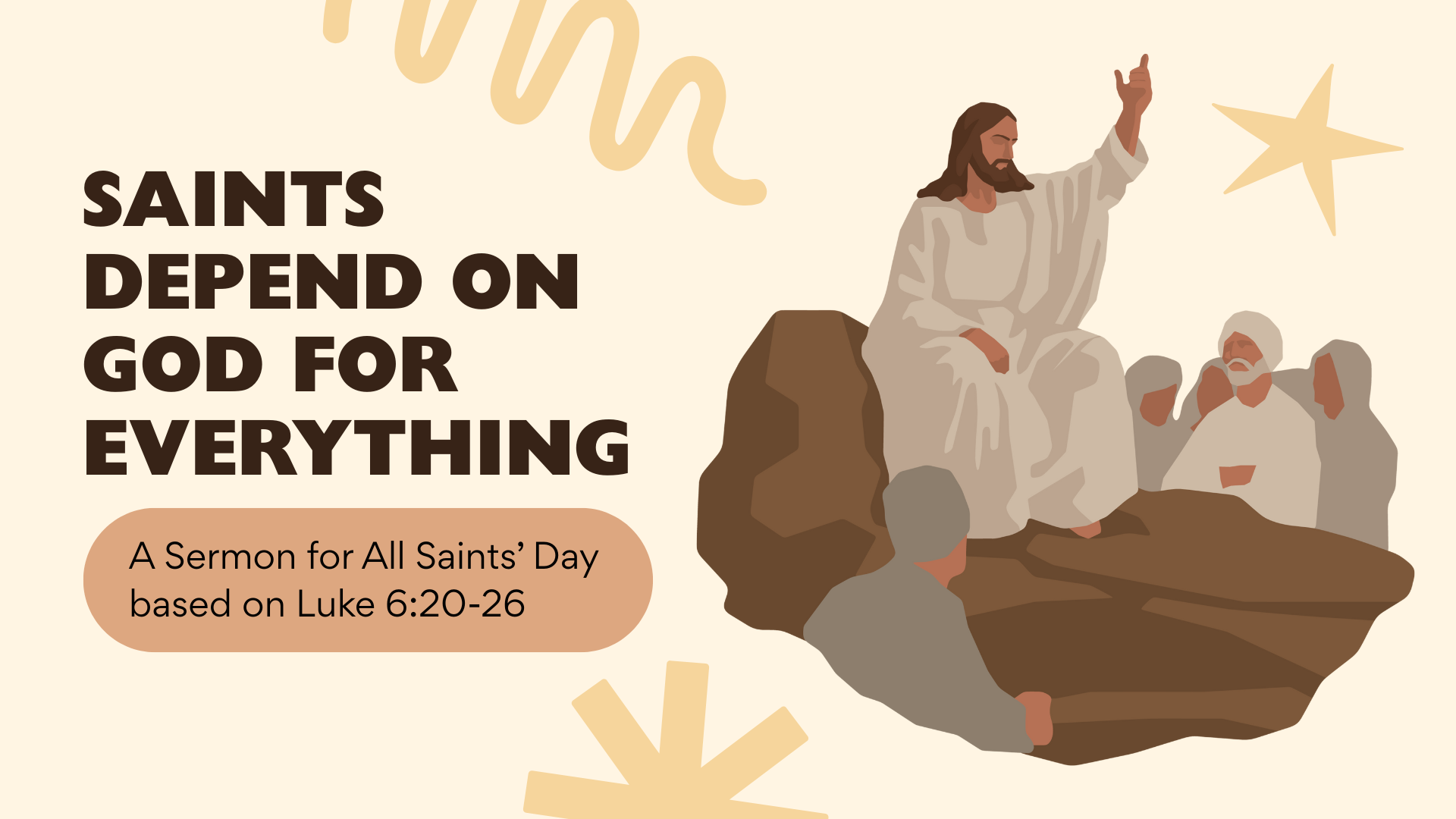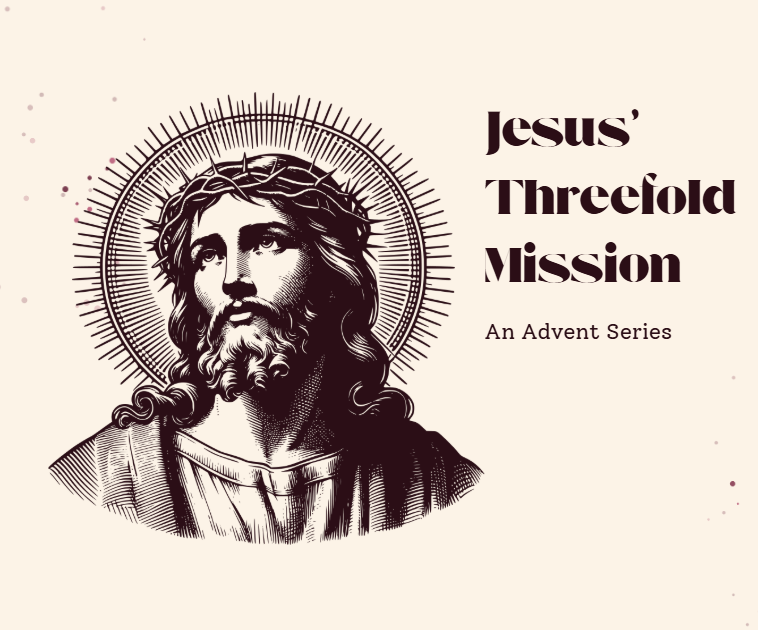All Saints’ Day – Luke 6:20-26 – Saints Depend on God for Everything

20 Looking at his disciples, he said: “Blessed are you who are poor,
for yours is the kingdom of God.
21 Blessed are you who hunger now, for you will be satisfied.
Blessed are you who weep now, for you will laugh.
22 Blessed are you when people hate you,
when they exclude you and insult you and reject your name as evil,
because of the Son of Man.
23 “Rejoice in that day and leap for joy, because great is your reward in heaven.
For that is how their ancestors treated the prophets.
24 “But woe to you who are rich, for you have already received your comfort.
25 Woe to you who are well fed now, for you will go hungry.
Woe to you who laugh now, for you will mourn and weep.
26 Woe to you when everyone speaks well of you,
for that is how their ancestors treated the false prophets.
Do you like your life? Where you’re at right now – is it satisfying to you? Think for yourself – don’t answer how you think you should, but how you truly feel! Do you like your life? Now, if you answer, “Yes. I do like my life.” I have a follow-up question for you: What if things stayed exactly the same? What if your kids never got older; never moved out of your house; your job stayed exactly the same as it is right now; the people in your life stayed exactly the way they are forever – how do you feel as you imagine a world of no change? Because even if you answered, “Yes! I love my life! It’s so much fun!” – the idea of nothing ever changing, though? That sounds like a nightmare.
Because life is a lot like a board game – like Candy Land. You want to progress, move forward. There’s a place for contentment – being happy with what you have – but then there’s being stuck – feeling like you can’t move beyond the square you landed at – having the same misunderstandings with the same people, working the same job every day over and over – feeling the same temptations and loneliness with no end in sight. That’s painful to think about.
Isn’t that why we want to go to school, and maybe even more school after that? Why single people date, why thrifty people save, why we plan? We want to progress. We have goals that we pursue – marriage, kids, a more fulfilling job, a different house – because we don’t want to be stuck!
We are great at dreaming of what life should be like. We human beings are fantastic at seeing opportunities for growth, identifying problems. I wonder if the disciples were thinking that way before Jesus spoke the words of today’s Gospel. Jesus had chosen twelve of his disciples and designated them as Apostles. By changing their title from disciples to apostles, Jesus changed the focus of their relationship to him – from disciples, students, learners to apostles, emissaries, preachers, participants in his ministry. And they get right to it. They don’t have to relocate themselves, because droves of people are flocking to Jesus from all over – both from Jewish regions like Judea and Gentile regions like Tyre and Sidon. People of all backgrounds rush to Jesus – they are healed, their demons cast out, and the gospel is preached. This is an exciting time!
So I wonder if the disciples – now Apostles – maybe thought to themselves, “This is great! Where are we going to go next with this? Jesus, how do we build upon this ministry effort?” If this same event happened in our day, a marketing team would spring forward. Agents would be calling Jesus asking to represent him. Someone would suggest he write a book and do a book tour. He would be overwhelmed with invitations for speaking engagements. Someone would be curating a social media profile and amassing a huge following. So if the disciples had this same energy, this same excitement to get things going and keep amassing a following, they would be disappointed by what Jesus says to them,
20 Looking at his disciples, he said: “Blessed are you who are poor,
for yours is the kingdom of God.
21 Blessed are you who hunger now, for you will be satisfied.
Blessed are you who weep now, for you will laugh.
22 Blessed are you when people hate you,
when they exclude you and insult you and reject your name as evil,
because of the Son of Man.
Jesus takes away the vision for the future and forces us to look at the present. He says to his disciples and to us that we are blessed. Don’t look for it in the future. Look at the Candy Land square your feet are at right now. This is a blessed place to be.
Um, okay? I’m ready to hear why, Jesus. Because right now, I look at my life and I see a lot of good – don’t get me wrong! – but I also see a lot of pain. I see a lot of failure. I see a lot of suffering. I can’t just think of a few things I want to be different about myself and my world, the list is actually endless. I see how I get in my own way, and how the behaviors of others around me affect me – especially those with authority over me. So, if you have a special secret to how to have a blessed and happy life, I’d love to hear it Lord.
Jesus says, “No, that is the blessing. The poverty you feel – not just financial poverty, but of energy, of willpower – that helplessness that you feel -blessed are you when you feel that. You’re hungry, maybe physically but also emotionally – needing to be filled up. When you cry, you’re blessed. And that thing that can make life feel like hell on earth – being ridiculed, bullied, made fun of, ostracized, alienated from your social community – that’s actually a good thing. And you should skip and dance when that happens to you.”
And you and I say, “This isn’t exactly what I signed up for. Jesus, I came to you to help me with these things – I am exhausted, tempted, stressed, in pain. I’m grieving. I’m guilty. I’m afraid. I’m at a loss. I’m overwhelmed. And I feel helpless – and your response is just to say, ‘Good’?” Is Jesus telling us that we have to accept the pain that we feel in our lives without wanting them to improve?
Notice how that makes you feel. Take note of what’s happening inside you as you consider what life would be like if you had to just accept the pain without hoping it would change. We have goals. We don’t want to be stuck on this same Candy Land square forever, we want to get somewhere. What if that’s what Jesus wants to do with these words? What if he wants to cause that cognitive dissonance? So that we take a second and ask ourselves, where the sadness or the disappointment in these words are coming from?
You and I didn’t come out of the womb with the goals we have now. The American dream of great job, happy marriage, two kids, a two car garage and a dog and a cat – that’s not inscribed on the human heart! But the water we’re swimming in teaches us what direction to go. A lot of the pain I feel in my life is because I don’t feel like I’m heading in the right direction, but have I ever stopped to think about whether or not it is the right direction? Or do we ever think about how we’re being taught to see ourselves as less-than in the present just because we’re not at a certain spot on the Candy Land board?
But we dwell on the future because the pain of the present can be too much. Maybe your answer to the question, “Do you like your life?” was “no! I don’t! I’m in pain!” And so it’s easy to dream of a better life in our future and envision how to get there, because the pain of the present is too much for us to handle. And as painful as that is, we often think to ourselves, “There’s gotta be something I can do about this.” But do you realize what you’re doing when you say that? You’re feeling all the very real and raw pain of human life, but you’re not letting go of the responsibility to make it right. No wonder you’re suffering, crushed under the weight of the pain you and everyone you love feel – because you stand under the weight of having to be the one to fix it.
If we’re led to believe that there are certain things we can achieve for ourselves and then everything is fine, then Jesus has a harsh message as his sermon continues:
24 “But woe to you who are rich,
for you have already received your comfort.
25 Woe to you who are well fed now, for you will go hungry.
Woe to you who laugh now, for you will mourn and weep.
26 Woe to you when everyone speaks well of you,
for that is how their ancestors treated the false prophets.
Jesus has nothing against people with wealth – some of the most prominent people in the early church had wealth. Nor did Jesus have a problem with eating, or laughing, or having a good reputation. These are all good things. The trick here is when Jesus says, “Now – fed now; laugh now, et cetera.” When you believe that you can make your life perfect in this life by meeting a few goals, Jesus is saying, the worst thing you can possibly do is meet them. The worst place to be is to love your life now and not want anything to change – not feel friction of any kind, not experience and form of need. Because the “now” is going to pass, and become the past. Your present moment of greatest joy is going to end. Then you will stand in the Judgment and Jesus will say, “Where were you? You estranged yourself from me. You had no need of me.” And you’ll say, “No I didn’t, Jesus! I loved you! I prayed to you. I sang to you. I did all that for you.” And Jesus will say, “You accepted me as a side character, as an advisor, as an advisor, when I am the Lord. You found comfort in your wealth or your friends or your job instead of primarily in me.” Because what did the false prophets Jesus refers to say? They preached messages like this: “Of course God will bless us! He has to! We have goals, and he must help us fulfill them!” They didn’t preach God as he actually was: a God who can call us blessed even when we don’t feel it or know how it will work.
Now, don’t get Jesus wrong. He is preaching to you and to me as one who intimately knows what it’s like to be physically and emotionally poor. He knows what it’s like to hunger. He knows what it’s like to be slandered and ostracized. He knows these pains greater than we ever will. So we should listen when he describes us as “blessed” when we experience them too.
Because Jesus showed what it’s like to be fully dependent on God. In human relationships, co-dependency is a very damaging thing. That is, when you depend on a human being for your entire emotional wellness; when you have no sense of yourself but you’re entirely wrapped up and preoccupied with how someone else feels. It’s harmful and damaging to have a relationship like that, primarily because human beings let you down. When you depend on a human being to make you feel good, they can’t always do that because they don’t always feel good. They can’t always anticipate your needs or your emotions. They can’t always give you what you want. So you learn to take care of yourself and to not burden your relationship as much.
But God is incapable of letting you down. It sounds weird to say God can’t do anything, but understand what I mean: It is not in God’s nature to let you down. He is perfectly powerful, infinitely loving, eternally gracious. If you have ever felt let down by God you can rest assured that it’s more because you misunderstood him and less because he actually let you down.
So when you realize that you are poor and hungry, emotionally and socially starved, completely on your own without a help in the world, feeling scared because you see where you need to be in your life and aren’t sure how you’re going to get there – you are blessed. You are in a happy position, because you realize that your help must come from somewhere else. It must not come from people. It must not come from money. It must not come from yourself.
Why does Jesus say that you are blessed when you’re feeling these terrible feelings? Because there is an answer to them. There is someone who is ready to comfort you when you’re crying, to feed you when you’re hungry, to award you with the riches of his kingdom when you’re poor – it’s simply no one other than God Almighty in heaven, by whose name alone we are saved.
Today we’re celebrating All Saints’ Day. Sometimes, when someone passes away, we say that they have been “sainted.” So, we remember those who have passed away with saving faith in their hearts, and now they’re with the Lord. Who comes to your mind? Think of a saint that you miss dearly, and you feel their absence from your life every day.
Certain memories return to you. Moments that didn’t seem all that important at the time, but your heart aches with grief because they meant so much to you. The way they used to smile at you or talk to you. The things they used to do to help you. They way they thought. The wisdom they had. And if you could have heard their thoughts, they were certainly not thinking, “I am leaving a big impression on your life right now!” they were just being themselves.
And now they enjoy the presence of the Lord. They closed their eyes in death, and when they opened them again they were with Jesus – free from hunger and pain, free from those things they put up with in life, entrusting that God would take care of them. They now enjoy the object of their faith: the freedom of being in the presence of the Lord. Their tears are wiped away by Jesus himself. Their pains soothed by the comforts of heaven. All this is theirs, and it’s going to be yours too. You so look forward to joining them in heavenly paradise one day. You’re counting on it!
But you are a saint, too. One doesn’t become a saint when they die, but when they come to faith. You and your deceased loved ones were sainted the moment God brought saving faith into your hearts.
As you think about the moments you cherish with your departed saint, and wish you could have more of – consider this: you are living those moments in someone else’s life right now. Those moments you wish you could get more of from the person you missed, you’re giving someone else those moments in your life right now. Someone else is going to miss you terribly when you go home to heaven, and someone else is going to comfort themselves in their grief by Jesus’ promise that they will join you.
Is that hard to believe? Do you find yourself resisting the fact that you could be doing someone that much good and be that important to someone else?
Well, you’re important to God. Yes, you, even you, are important to him. Your loved ones who have passed on were important to him. You are important to him now.
You know, preparing a sermon is not a simple task. Every week, millions of pastors around the world pour over these texts, and the best of the best know how to treat what the text says as most important. Don’t just say what you want to say or notice what you want to notice, but what the text itself says.
But there’s something that grabbed my attention with this lesson and it hasn’t let go. It’s how it all begins. Jesus’ eyes turn to his apostles, to his disciples. Now, maybe this is Luke’s way of just telling us whom Jesus was talking to with this sermon, but I can’t shake the impression these words leave upon me, and I hope they leave the same on you.
Jesus’ eyes turn toward you, and when he opens his mouth to speak to you, he acknowledges your feelings. He says, “I know you’re poor. I know you’re hungry. I know you suffer. I know you’re trying to do the right thing. I know you’re being mistreated because of it.” And he says to you, “You are blessed, because I am yours. You can depend on me to dry your tears and to feed your soul.”
And you who depend on Jesus for all – you saints – yours is the kingdom of God. Depending on Jesus is not weakness or failure. It’s not losing your sense of self in the relationship with God. But it’s becoming a part of the kingdom. Trusting that God is doing good through you. God is leaving a Christ-shaped impression on the lives of others – countless others! – through you, and in ways you will never fully realize.
When you hug your kids, you don’t always say, “I’m doing this because I love Jesus.” When you ask your coworker how her weekend was, you don’t think, “I’m showing curiosity in her life because I love Jesus.” Maybe sometimes you do, but usually it’s not such a conscious decision. And yet your dependency on Christ for everything frees you to show love to others, interest in others, patience with others, even when it hurts and even when it’s hard. And you trust that when you are doing that, you are leaving behind moments that seem small to you, but aren’t small to the people you touch. You are leaving behind impressions of the kingdom of God, which you became a part of when you came to faith. You are showing what it means to depend on Jesus in big ways and little ways. And since there’s more than enough Jesus to go around, God may very well use you to lead others to depend on him, too.
That’s what it means to be a saint.







